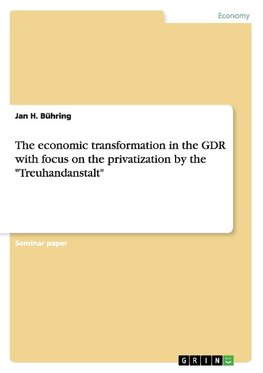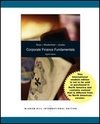
-
 Anglický jazyk
Anglický jazyk
The economic transformation in the GDR with focus on the privatization by the "Treuhandanstalt"
Autor: Jan H. Bühring
Seminar paper from the year 2013 in the subject Economics - Other, grade: 1,0, University of Wroclaw (Master of Managerial Economics), course: Economic Policy, language: English, abstract: For an appropriate comprehension and consequently treatise of the... Viac o knihe
Na objednávku, dodanie 2-4 týždne
17.55 €
bežná cena: 19.50 €
O knihe
Seminar paper from the year 2013 in the subject Economics - Other, grade: 1,0, University of Wroclaw (Master of Managerial Economics), course: Economic Policy, language: English, abstract: For an appropriate comprehension and consequently treatise of the German 'Treuhandanstalt' (THA) or shortened 'Treuhand', trust agency as literal translation and privatization agency as analogous translation, it is absolutely necessary to keep in mind the history and context.
"It would be hard to devise a better controlled experiment for comparing different economic systems than the experience provided by East Germany and West Germany: two nations that formerly were one, occupied by people of the same background, the same culture, and the same genetic inheritance, torn apart by the accident of war. On one side of the Berlin Wall is a relatively free economic system; on the other side, a collectivist society" (Milton Friedman 1986, cited in Collier/Siebert 1991: 196).
Milton Friedman was assuredly surprised when his ideal field for experimentation of comparing ran in another direction three years later. As commonly known, the mentioned Berlin Wall fell on 9 November 1989 and became the starting point of a never seen before transformation of the German Democratic Republic (GDR) according to his geographical and geostrategic position also known as East Germany. Nevertheless the statement of the recipient of the Nobel Memorial Prize in Economic Sciences and in general one of the most famous economists of the 20th century remains unaffected. The origin of the so-called 'German reunification' or 'the turning point' is unique; the still special circumstances liberated by the fall of the Berlin Wall, which only formed part of a series of the demolishing Iron Curtain, led to incomparable possibilities regarding transformations in many countries in Central and Eastern Europe (CEE). The formal political accession, occurred on the 3rd October 1990, is a quite famous date and its anniversary is nowadays the national day, the 'day of German unity'. The Federal Republic of Germany (FRG), previously known as West Germany, from this day forth consisted of sixteen federal states, eleven old and five new ones. But another, earlier aspect of the reunification is not so well known: the bilateral state treaty about the creation of a monetary, economic and social union (MESU) of 18 May 1990, that came into effect on 1 July 1990. This was the comprehensive economic integration of the command economy GDR in the capitalistic, more precisely social market economy, FRG.
- Vydavateľstvo: GRIN Verlag
- Rok vydania: 2014
- Formát: Paperback
- Rozmer: 210 x 148 mm
- Jazyk: Anglický jazyk
- ISBN: 9783656710547












